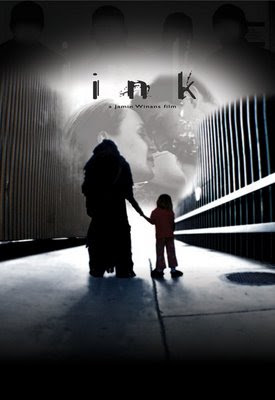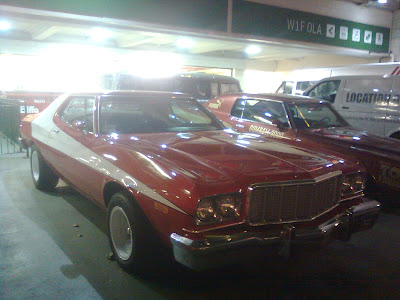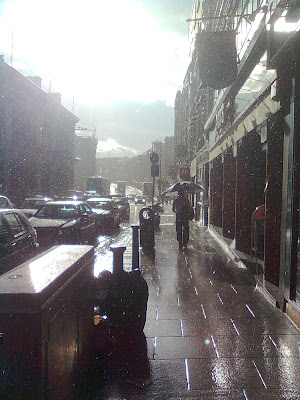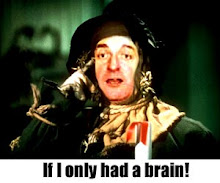Sunday, August 29, 2010
Friday, August 27, 2010
Mr. Nobody
 Mr. Nobody - A Very Big Something of a Movie
Mr. Nobody - A Very Big Something of a MovieI know I am going to be in the minority on this one, but Jaco Van Dormael's "Mr. Nobody", his first English language movie (and his first since 1996; what's that all about!), is a place where science fiction, fantasy and poetry all come together, and something of a triumph. A kind of reworking of 'Slaughterhouse Five', for the Chaos theory age, "Mr. Nobody" features Jared Leto as, well, quite a few incarnations of the same person, all with different lifelines, and all struggling for the things we all want.
Van Dormael shows himself to be a fan of sci-fi with references to Alfred Bester (the tattoos of the doctor), Sturgeon (the guys setting up reality), obviously Vonnegut, and Philip K. Dick (well, there's Mars, and timelines, and...), but that's really all window dressing to a poetic concern with choice, loss and possibility.
To my mind it brings back good memories of his earlier "Toto the Hero" (remember the dancing flowers and that song, 'Boom!' ). That movie dealt with alternative histories, choice and Fate too. However, whereas most European directors who make an English language movie rein in their preoccupations for Hollywood, Van Dormael really goes further out here than ever before. For many it will be over-ambitious. It is a difficult movie to stick with, and one that will not leave you with easy answers. But hell, I bought it! And I'm pretty sure I enjoyed it in a few other realities too....
Labels: Fantasy, Film, review, Science Fiction
Saturday, August 21, 2010
Part of the Whole
I came home drunk (thsnks J. for the use of your neck) and turned on BBC4. The Proms were on as usual and a description gave the programme. Ravel's Piano Concerto for left hand - lovely - Scriabin's Poem of Estacy - well, okay, if you must, and Arvo Part's new symphony. Arvo Part's new symphony. Why don't you say Beethoven has risen from the grave and is quite keen on a 6th piano concerto. Arvo Part!!!!!!!
(And he was in the audience.)
Labels: Music
Thursday, August 19, 2010
Opportunity?
With Britain gearing to reduce its number of university places, shouldn't a small English-speaking country like Ireland be increasing its number of places?
Wednesday, August 18, 2010
Ink
 Ink - the kind of dream movie Hollywood should be making (instead of that other one with Leonardo Di Caprio...)
Ink - the kind of dream movie Hollywood should be making (instead of that other one with Leonardo Di Caprio...)When it comes to films about dreams, and speaking as an admirer of the work of Chris Nolan, forget the bloated budgeted 'Inception' (yes, I'm still bashing that one). Instead look to the little known little film, "Ink".
Set in a fantastical world where those who give you nice dreams - the Storytellers - battle those who give you nightmares - the Incubi - the story centres around the enigmatic Ink, neither one nor the other. While the two sides go about their nightly business, he kidnaps a young girl sparking off a rescue mission by the Storytellers. It's much more complicated than that of course and interwoven with Ink's travels are several layers of story that perhaps might not bear too close a scrutiny. However, accepting a dream logic entirely appropriate to the tale being told, it all hangs together surprisingly well.
It's also stunning in many, many different ways. The originality of the story extends far into the production itself, giving the whole enterprise a unique feel. For instance, the Storytellers all appear in flashbulb pops of light, while the Hellraiser-ish Incubi appear out of shadow wearing eerie grins and strange screens on their faces. Drums are used to open portals from one dreamscape to another, while 'drifters' mark territory between the principal factions. Jamin Winans' direction too is far from conventional and heightens the unsettling atmosphere. The overall effect is to create an authentic fantasy world with a well-developed mythos that stands up well against more famous creations like Oz or Middle-Earth.
Archetypes, common to the genre, are also used originally. Take the Holy Fool character of the Pathfinder. As played by Jeremy Make he jumps far too easily from 'wacky' to 'angry' and, resenting the performance, one could easily dismiss him. However, we don't (well, I didn't); he cuts a memorable figure for all the actor's limitations. Blind, wearing duct tape crosses over his eyes, he is attuned to the rhythm of the life, chanting a metronomic "1,2,3,4" as he navigates the world. Initially irritating, this chant builds to become a powerful motif, culminating in one standout sequence where he sets off a chain of events just to 'shake the shit' out of someone. Like a string of dominoes, a street artist painting a picture somehow triggers a car crash. It looks dreamlike and even more importantly feels magical.
All this despite the cold hard reality that this movie was made for peanuts. It features no one you've ever heard of and didn't even get a distribution. In fact the legend has it that it was made for €250,000! This is simply insane, especially given that it plays Hollywood off the pitch on every level. There is no major fantasy film of the last ten years that takes the chances 'Ink' does and wins.
The legend continues that when no company would take up the film to distribute, the only way the film could be seen was by illegal download. Unorthodox, and not entirely endorsed (though the producers have subsequently celebrated piracy), this nevertheless opened the movie to a hitherto inaccessible audience. (It can be 'rented' on Youtube and is free to view on some sites.)
While watching it, another low-budget fantasy flick, 'Mirrormask', often came to mind. It too uses a young girl and her travels in a fantasy realm to counterpoint a harsh reality, but 'Mirrormask' was the brainchild of fantasy heavyweight, Neil Gaiman. 'Ink' has no pedigree, no money, and yet still triumphs through originality, beauty and sheer bravura.
'Ink' is not without its faults. An unknown cast is bound to have some weak links (though the leads, especially little Emma, are very strong). The story, as I've said, depends a little too much on circular reasoning, and the dialogue requires some polish. However, the ambition on display, the desire to tell a complex story with complex characters, ultimately wins out. A masterpiece of low-budget filmmaking, everyone should give 'Ink' a chance.
Tuesday, August 17, 2010
The Idiots are Winning....
It's five years after the fact, but I've only just finished watching "Nathan Barley". As befits a series written by Chris Morris and Charlie Brooker, and featuring The Mighty Boosh, it has some wonderfully funny moments (the cat with the scissors in the head will live with me forever). However, it reminds me somehow of some Roadrunner or Tom and Jerry cartoons I experienced in my youth. You know, the ones where you're really rooting for Wile E. Coyote or Tom, but you know they'll never really win. It gets to depress you after a while. The pain of poor Dan Ashcroft (Julian Barratt) facing a world where the idiots are winning is just too, too close to the bone. Roadrunners are all around. The smarmy, beeping shits are everywhere!
Labels: Comedy
Tuesday, August 10, 2010
Nazi Literature in the Americas
Roberto Bolano's fictitious account of Fascist literati in North, Central and South America is diverting in so far as it goes, but nowhere near as funny, vicious or imaginative as I hoped. Effectively a collection of pen-pictures, the most effective chapter is Bolano's first person account of Ramirez Hoffmann, a pilot in the Chilean air force and sociopathic poet. No doubt based on any number of Chile's military murderers in the 70's, Hoffmann is a chilling character, and the chapter affects, but it stands out like a sore thumb compared with the faux objectivity of the other character entries.
"Nazi Literature" was very readable and it may grow on me over time, but the day after finishing it, I'm still a little disappointed.
 Stephen's Green 08/05/2010
Stephen's Green 08/05/2010 Dublin 23/05/2010
Dublin 23/05/2010 Dublin 20/06/2010
Dublin 20/06/2010 Dublin 20/06/2010
Dublin 20/06/2010 Dublin 20/06/2010
Dublin 20/06/2010 Dublin 20/06/2010
Dublin 20/06/2010 Dublin 20/06/2010
Dublin 20/06/2010 Dublin 20/06/2010
Dublin 20/06/2010 Dublin 20/06/2010
Dublin 20/06/2010 London 09/07/2010
London 09/07/2010 London 10/07/2010
London 10/07/2010 London 10/07/2010
London 10/07/2010 London 10/07/2010
London 10/07/2010 Friday Evening (27/10/2010) - Dame Street
Friday Evening (27/10/2010) - Dame Street
